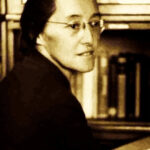Published October 30, 2015
On October 29, 2015, EPPC Fellow Mary Rice Hasson and her husband, Kevin J. “Seamus” Hasson, received the 2015 Saint John Paul II Award for the New Evangelization from the Catholic Information Center in Washington, D.C. (EPPC Distinguished Senior Fellow George Weigel was honored with the New Evangelization Award in 2013.)
Here is the video that was produced by CIC in honor of the Hassons:
Here is the video of the remarks delivered by Mr. and Mrs. Hasson upon receiving the award; the text of Mrs. Hasson’s remarks is below:
Thank you!
Your Excellencies, Fr. Arne, honored guests, and dear friends,
Seamus and I are greatly honored and truly humbled to receive the St. John Paul II Award for the New Evangelization. And we are so very grateful for the Catholic Information Center, for the great good that you do, forming and inspiring the next generation of Catholic leaders.
I am thankful too for Ed Whelan, George Weigel, and my colleagues at the Ethics and Public Policy Center. It is truly a privilege to work with such brilliant thinkers and people of the highest integrity.
All our children are here, and I want to thank them as well. You know our weaknesses and flaws, but I hope in the midst of that you have seen forgiveness, perseverance, and love–however imperfect–and the faith that sustains us in all.
I’d like to share with you a few thoughts on evangelism.
A long time ago, when I was in law school, someone prayerfully told me that he thought I had a gift for evangelism.
I was horrified.
The only “evangelists” I knew were Protestants, and I had a caricature in my head—during my summer internship at a New York Law firm, there was a street corner evangelist outside of Penn Station, with a Bible in one hand and a megaphone in the other. It was the last thing a twenty-something young woman like me aspired to be.
But about that time, John Paul became Pope and in the ensuing years we Catholics embraced deeply the truth that we are all evangelists. By virtue of our Baptism, we are called to be “evangelical Catholics,” as my colleague George Weigel describes it.
Nearly thirty years ago, Pope St. John Paul II wrote the Apostolic Exhortation Christifideles Laici (On The Vocation And The Mission Of The Lay Faithful In The Church And In The World), a document as rich in truth and as relevant today as ever. John Paul II profoundly understood the human person—and he profoundly understood the cultural challenges posed by the “–isms” of the day: communism (which he experienced personally in Poland), and materialism, secularism, hedonism, and moral relativism—the “-isms” afflicting modern culture. These are the same challenges, by and large, that we face today.
In his Exhortation on the role of the laity, John Paul II reflected on the role of women in evangelization, saying that women, in particular, have been entrusted with two great tasks: The first is to bring “full dignity” to the “conjugal life and to motherhood.” And women’s second, related task is to “assur[e] the moral dimension of culture, … a culture worthy of the person.”
I take those words very much to heart.
It’s worth asking, nearly 30 years after John Paul II wrote those words, how are we doing? How well are we shaping the moral dimension of culture? It’s a question we must answer—we can’t avoid it—because it’s clear that the culture around us inevitably shapes not only the urgency of our evangelistic mission, but also the ‘who, when, and how’ of our evangelism.
So I found myself asking, if women are to shape the moral dimension of culture, then…
- How is it that women, who march for peace and campaign against violence—and who are all about relationships—how is it that women champion, as an expression of personal autonomy, the right to violently end (through abortion) the most intimate relationship possible to any human being—that of a mother and her unborn child?
- How is it that women, powered for decades by the mantra of “equality now,” can rant against male privilege, domination, and abuse, and yet it is women who drove the novel 50 Shades of Grey to the top of the best-seller lists, and women who flocked to the theatres by the millions, romanticizing a tale of a woman’s abuse and degradation.
- How is it that women, whose hearts naturally turn to the spiritual, turn to now to new age “crystals” and a vague spirituality of self instead of God, and raise children who don’t even know the vocabulary of belief, much less know the very real Person whose eternal love awaits.
- How is it that young women of today, who down deep truly desire to find a lifelong love—how is it that women exult in the “right” to be sexual objects, to claim, as a recent New York Magazine article highlighted, that it’s empowering (a measure of women’s sexual ‘agency’) to pursue meaningless sex, to be used and discarded after a night of hook-ups?
- And how is it that women, who used to declare “I am Woman,” have become so confused about who they are—that it is women who cheer when Bruce, a very confused man wearing a new name, makeup, and manufactured female ‘parts,’ is named “Woman of the Year” by Glamour
- And how is it that when Ireland—a Catholic country where the faith of Irish mothers is legendary—legalized same-sex marriage, the leaders of the ‘marriage equality’ movement there said it was Ireland’s mothers who gave them the win.
John Paul II is right—women do shape the moral dimension of culture.
But it looks like the wrong women have had the upper hand in shaping the moral dimension of culture.
Women shape the moral dimension of culture… and the powers behind the “isms” at work in our culture know that. That’s why campaigns by international foundations, NGO’s, and governments alike specifically target “women and adolescent girls” in their efforts to shape the culture, to promote ‘sexual rights,’ abortion, and same-sex marriage. Empower a woman, change the culture.
So here’s the good news: Catholic women have not been idle the past thirty years. There’s a vibrant generation of women, well schooled in their faith, with hearts on fire for the Lord, who are already hard at work.
In my work with the Catholic Women’s Forum, I’ve been in contact with hundreds of women leaders and am struck by the wide range of efforts that women have undertaken, often quietly, often with little support, to evangelize the culture. From efforts like Kathleen Bravo Eaton’s Obria medical clinics, which provide a full-service alternative to Planned Parenthood, to CanaVox, where mothers learn how to support and defend marriage, to programs like ENDOW, started by Terry Polakovic, which educates women in parishes on the dignity and vocation of women, and many more.…And at the same time, we see the difference it makes to have the work of brilliant female theologians, like Margaret McCarthy of the John Paul II Institute for Marriage and the Family, and Sr. Sara Butler, a former member of the International Theological Commission, contributing greatly to the Church’s theological and pastoral thinking, and we have the leadership of women in journalism, such as Kathryn Lopez of Catholic Voices, and in law, where Professor Helen Alvare is a powerful voice within the culture, speaking up for the authentic dignity of women, the rights of the family, and religious freedom.
But we need to do more. We need to amplify within the culture, the voice of Catholic women who support the Church’s teachings—women who see in those teachings the path to women’s happiness, equality, and authentic freedom. Who know that women flourish when they live according to the truths of our faith.
As John Paul II wrote 30 years ago in Christifideles Laici, there’s “a particular urgency” for the lay faithful to act. He said back then, “If lack of commitment is always unacceptable, the present time renders it even more so. It is not permissible for anyone to remain idle.” Similarly, in our own day, the evangelist Bishop Robert Barron, wrote recently: “If intellectually serious believers absent themselves from the wider conversation and retreat to their libraries and classrooms, the public space will belong to the atheists and secularists.”
And that’s the challenge we face—to reclaim our public space. To ensure that within our culture, faith and virtue have room to grow.
It’s time for men and women within the Church to bring the efforts and witness of women to the foreground of the Church’s work evangelize the culture—not just for the strategic reason that women are half the population—and we must reach them and speak to them through shared experiences and in language that resonates. But because as a Church, we must live the truth that we preach: That men and women are complementary—that we need each other, and we need to collaborate, that the Church needs our witness to the world, a sign of the great bond between Christ and the Church. The Church needs us—men and women—to witness to the love of God in a powerful way, together.
John Paul II wrote that women’s specific sensitivity towards the human person is one reason why women are particularly called to shape the culture. Our focus on relationships is central to building the “culture of encounter” that Pope Francis calls us to create, that “culture of encounter” within which evangelism occurs.
And Pope Francis in Evangelii Gaudium (264) wrote, “The primary reason for evangelizing is the love of Jesus which we have received, the experience of salvation which urges us to ever greater love of him. What kind of love would not feel the need to speak of the beloved, to point him out, to make him known?”
In other words, evangelism is nothing to be afraid of—it’s simply introducing our friends to the one we love. And introducing our friends to the one we love is something we women know how to do. Introducing our friends to Our Beloved is natural too. And if we find ourselves lacking that desire to make the introduction, then we need only ask God to help us love him more deeply and openly, so that we can share with the world the treasure of His great love.
A powerful love gives rise to evangelism—A love that’s powerful enough for us, men and women together, to shape the culture.
Mary Rice Hasson is a fellow at the Ethics and Public Policy Center and the director of EPPC’s Catholic Women’s Forum.












